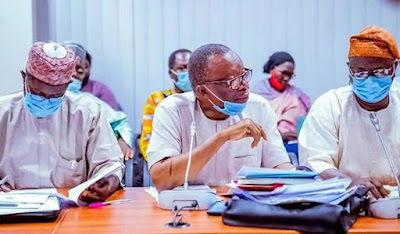The Academic Staff Union of Universities on Tuesday gave the President Bola Tinubu-led Federal Government two weeks ultimatum after which universities may be plunged into industrial crises.
The National President of ASUU, Prof. Emmanuel Osodeke, while addressing journalists at the University of Abuja, said the union decided to give the new administration enough time to address pressing challenges in public universities but was met with disappointment.
Osodeke noted that the National Executive Council of ASUU met at the Obafemi Awolowo University, Ile-Ife between Saturday, May 11 and Sunday, May 12, 2024, to take a critical look and evaluate the situation.
He noted that the NEC observed that there are currently no serious efforts by the government to “redress the ugly situation”.
In this piece, here are nine “sins” of the Tinubu administration as listed by ASUU.
– Renegotiation of the FGN/ASUU 2009 agreement: ASUU and previous administrations have been at loggerheads over the failure to renegotiate the 2009 FGN/ASUU agreement which contains details about the welfare of academics among other issues. Osodeke said that the Muhammadu Buhari government refused to approve the draft agreement which was proposed by the late Emeritus Professor. Nimi Briggs panel for reasons best known to them, it faulted the increment in salary approved by the Tinubu government noting that, “Even with paltry salary award, the current take-home pay of a professor at the bar is about $500 per month. In the face of a heightened tax regime, what a professor earns is about $400 per month which is a scandalous under-valuation of the scholarship.”
– Governing Councils in universities: In June 2023, the Tinubu administration ordered the dissolution of governing councils of all federal universities. ASUU on Tuesday described the failure of the government to reinstate the council members as an act of illegality.
“Outgoing VCs are working in cahoots with the Federal and State Ministries of Education to illegally run universities daily. They routinely usurp the powers of Governing Councils to recruit and discipline staff as well as manage university finances in manners bereft of transparency and accountability,” ASUU said.
The union urged the citizens to hold the government responsible, “if the matter of the Governing Councils is allowed to snowball into an avoidable industrial crisis.”
– Integrated Personnel and Payroll Information System: The union once again raised issues around the IPPIS payment platform. Recall that the Federal Government had in December 2023 announced that academics be exempted from the IPPIS platform. However, ASUU noted that the platform is, “still used to pay our members under the guise of the “new IPPIS” contrary to the agreement reached at the 11th January 2024 stakeholders’ meeting held at the National Universities Commission.” ASUU noted that its stance remains unchanged on the matter.
– New Curriculum for Universities: the National Universities Commission in 2023 unveiled a revised curriculum for Nigerian universities. The curriculum known as Core Curriculum Minimum Academic Standards popularly referred to as CCMAS was rejected by ASUU. The union again on Tuesday mentioned that it observed that the NUC was enforcing the implementation of the new curriculum in universities.
On why it stands on the rejection of the CCMAS, ASUU said, “Almost all universities are being burdened with funding resource verification for migrating from the erstwhile curriculum to the new curriculum. ASUU considers these developments as infractions that are unhealthy for the Nigerian University System.”
– Proliferation of Universities: the body of academics again expressed dismay at the proliferation of universities by Federal and State Governments. ASUU reminded the government that the issue of proliferation was one of the reasons it embarked on its previous strike and warned the government to tread the path of caution.
“Rather than supporting our advocacy for adequate funding of public universities, each senator is pushing for the establishment of a university as party of their constituency projects while governors who cannot fund existing universities are creating two or more purely for electoral gains.”
– Funding of Universities: ASUU faulted the diversion of TETFund intervention fund to the student loan scheme. The union urged the government not to divert TETFund resources to funding loans.
“Federal and State governments should rise to their responsibility of adequate funding to arrest the emergent rot and decay that are becoming more noticeable on the campuses of Nigeria’s public universities,” ASUU warned.
– Creeping fascism in some Nigerian universities: ASUU lamented the unjust sack of some of its members in some universities namely Lagos State University, Kogi State University, Federal University of Technology, Owerri among others. ASUU described the acts as fascist and said that it stands solidly with its members anywhere they are unjustly treated.
– Arrears of Earned Allowances and non-release of owed salaries: ASUU expressed sadness over the failure of the government to release backlog of Earned Academic Allowances which was captured in the 2023 budget for Federal Universities.
“In addition, the outstanding three and half months’ salaries witheld during the preventable nationwide strike action remains unpaid to our members in the federal universities. ASUU condemns this seemingly disinterested of concerned authorities about these issues of life and livelihood of our members across the campuses. It will be unfortunate if the union is forced to take some unpleasant actions to address all these lingering issues,” the union warned.
– The state of the nation: ASUU lamented the socio-economic crisis of Nigeria. The body noted that the quality of lives of ordinary Nigerians has “precipitously declined and the gap between the haves and have-nots is daily expanding. The rich getting stupendously richer while the poor are absolutely getting poorer.”
ASUU urged the government to immediately provide solutions and reclaim the country’s sovereignty and restore the confidence of Nigerians in their country.






